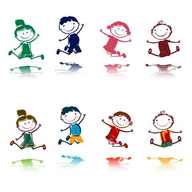
Fast Facts
on Children's Brain/Body Development
Did you know . . .
on Children's Brain/Body Development
Did you know . . .
|
KIDS FOCUS ~ Brain-Body-Balancing for Young Learners Simple Movements to help children focus, feel calm, and self-regulate - in under a minute! Drug-free help for ADD/ADHD, learning and behavior |
|
